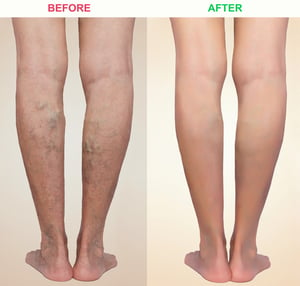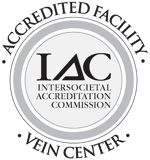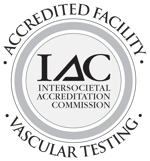You may have had varicose veins for some time and someone has told you they could be dangerous.
Or, perhaps, someone saw you at the little league field and asked, “How did you get that black-and-blue bruise on your leg?”
In both instances, you may have gone to the Internet to find the answer and are either confused or petrified, or excited at the prospect of treating them.
Let’s begin with some facts:
- Varicose veins are NOT dangerous! If you do nothing about them, nothing bad will happen to you. You cannot lose your legs from varicose veins. There is no credible evidence that they even increase the risk of deep vein thrombosis (DVT) — blood clots in the deeper veins of the legs. Varicose veins will not cause deadly blood clots that travel to your lungs or heart.
- Varicose veins can cause pain or discomfort. While they are not dangerous, they may make your legs feel tired, heavy and may even be painful — particularly during specific times of the menstrual cycle.
- Varicose veins are not caused by crossing your legs or wearing high-heeled shoes. This is an “old wives’ tale,” and therefore, there is no scientific support for this. Crossing your legs for hours could certainly increase the risk of blood clots forming but increasing the likelihood of varicose veins forming — nope!
- Varicose veins are genetic. That is very likely true! There is a strong predisposition for people whose parents (usually mothers) who have had varicose veins to have them also. This is increased by the number of pregnancies you have — the more pregnancies, the more likely you are to develop varicose veins.
Perhaps the most upsetting situation we frequently see is a patient who has been told that they need to have their veins taken care of because they are dangerous. Treatment for varicose veins has become quite simple and minimally invasive. We are actually able to care for all varicose vein problems in outpatient settings without hospitalization. This does NOT mean that the reasons for performing the procedures should change.

If you are concerned about the way your legs look or feel, it is reasonable to have the veins removed. Simple removal of the veins (phlebectomy) or obliteration of the deeper vein that has abnormal valves leading to the development of varicose veins (ablation) is a relatively simple solution to the unsightliness of varicose veins. This will also relieve some of the heaviness or pain often associated with varicosities.
It is important that a proper vascular evaluation be performed in advance of any intervention. Ultrasound examination of the leg in an accredited vascular laboratory will assure that the correct procedure is performed for the appropriate reason! As physicians, we believe it is important that conservative measures be attempted prior to undergoing any invasive —albeit minimal — procedure.
Of course, there are people who simply want to have their veins removed for cosmetic reasons. This requires a careful vascular examination and an honest discussion of the anticipated results. It is important for patients to have realistic expectations from the outset; it is highly unlikely that one’s legs can be reverted to the youthful, clear appearance that existed at the age of 18 years old! However, a reasonably close facsimile is possible to achieve.
Advances in vein care continue and new techniques become available. However, the underlying physiology remains unchanged since the early 1900s. Because of this, it is the responsibility of the vascular specialist to deliver the right care for the right reason in the right manner in an effort to achieve the right result.
Clifford M. Sales, MD, MBA, FACS is a board certified vascular surgeon and chief of Vascular Surgery at Atlantic Health System’s Overlook Medical Center in Summit. He is also a physician with the Vein Institute of New Jersey. He is recognized as a leader in the field of vascular surgery with expertise in peripheral vascular disease, vein problems and the management of vascular disease.









.jpg?width=944&name=Castle-Connolly-Top-Doctors-Emblem-Large%20(4).jpg)